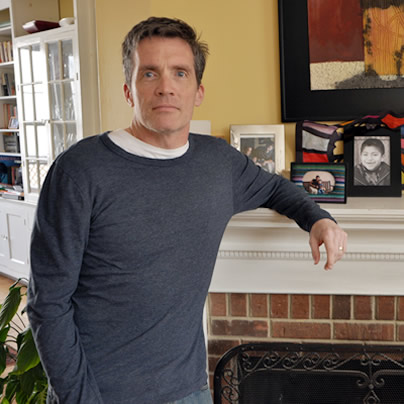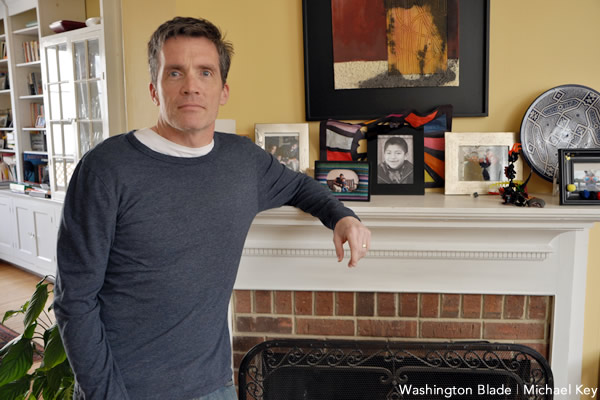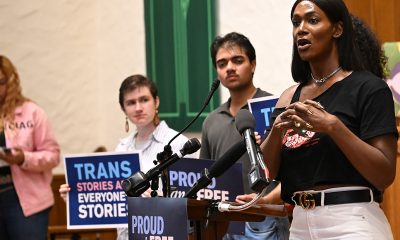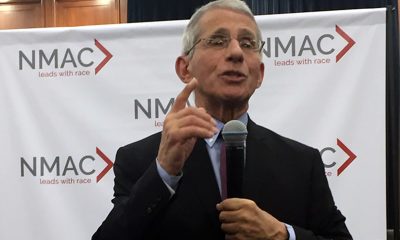Arts & Entertainment
Mark of the ‘Beast’
Novelist Louis Bayard explores Brazil circa 1914 in new adventure


In Louis Bayard’s new novel, Col. Theodore Roosevelt and his son, Kermit, are kidnapped by a mysterious Amazonian tribe in Brazil circa 1914 and must find and kill a ravenous beast to survive. (Washington Blade photo by Michael Key)
‘Roosevelt’s Beast’
By Louis Bayard
Henry Holt and Company
Available March 18
320 pages
Hardcover
$27
Appearances:
Politics & Prose
5015 Connecticut Ave., N.W.
March 23
5 p.m.
One More Page Books
2200 N. Westmoreland St. No. 101
Arlington, VA
March 27
7 p.m.
Listen for Bayard on the “Diane Rehm Show” (WAMU 88.5)
On March 24 at 11 a.m.
Details at louisbayard.com
Washington novelist Louis Bayard, whose new work “Roosevelt’s Beast” will be released Tuesday, spent a whirlwind hour with the Blade two weeks ago touching on everything from how he got started and how his career developed to what he tells young writers in his classes at George Washington University and how he wrestled the “Beast” that is his latest novel.
Bayard, 50, and his partner of 26 years, Don Montuori, are married and have two sons, ages 13 and 11. They live in Capitol Hill. Bayard, born in Albuquerque but raised mostly in Springfield, Va., moved to Washington in 1988, worked on the Hill and later did PR for various environmental groups through the ‘90s. His first novel, the gay-themed “Fool’s Errand,” was published by gay press Alyson Books in 1999. “Roosevelt’s Beast” is his sixth book. He’s not sure how many books he’s sold total, but upon consulting with his publisher, estimates the number to be about 100,000.
His comments have been slightly edited for length.
WASHINGTON BLADE: You went to Princeton and Joyce Carol Oates is quoted on the back of your new book. Did you take her creative writing course?
LOUIS BAYARD: Yes. She was also my adviser.
BLADE: What did you learn from her?
BAYARD: She was a very exacting reader, so it forced me to think about every word I write and I really do sweat every word. You do sometimes start to think over the course of a book, “Does this really matter,” but I revise and review and I think it’s because I had that kind of very hard eye that sniffs out deceit and flabbiness and all the stuff that can go wrong in prose. I don’t recall any specific lesson. I just recall how nice it was to feel understood by somebody of her caliber.
BLADE: Was it a big leap from Alyson to HarperCollins, which published your third book “Mr. Timothy”? How did that play out?
BAYARD: Alyson was one of the few places that would take an un-agented manuscript. The first book was gay-themed and they were a gay publisher so I just thought, “Why not take it straight to them?” It was a good fit for what I was doing. … But then when I had an idea for this book about Tiny Tim (2003’s “Mr. Timothy”), I thought, “I don’t just want this to be plunked on the gay shelf at Borders.” There was that sense of being ghettoized by virtue of being with a gay press. You go on that one shelf in the back of the store. I wanted this out in the front, so I found an agent, finally, after several tries, and he pitched it to the big houses and one of them bit.
BLADE: Would you call that your big break?
BAYARD: I guess you’d call it a break. It seemed like a break at the time. It was a break toward the mainstream, I guess, but I never felt like I’ve left the gay sensibility entirely behind.
BLADE: Do you enjoy teaching?
BAYARD: I do. I wish it paid a little more honestly. I’m there as an adjunct where you’re paid some ridiculous pittance for a lot of work, but I have other income sources. I just teach one fiction writing class.
BLADE: What do you tell your students?
BAYARD: To me, every student is a little different and they all bring something a little different so I just try to create a space where they can experiment and find their own voices. … It’s a workshop, so I’m basically like Socrates there in the midst, throwing out questions and making them think about things.
BLADE: About how many would you say have been good enough to get published?
BAYARD: Of the three years I’ve been doing it, I would say, maybe there were about that many who had the potential to do it. It would really be about desire. Actually the best writer I know of, and I can’t even remember her name offhand, but she was exceptional but actually was the least interested in pursuing it. I kept saying, “You really need to try this,” but she kept saying, “Well, I’m going to Europe” and she had all these plans. She just didn’t seem excited about it. That’s where perseverance pays off as much as anything.
BLADE: You went from gay contemporary fiction into several novels of historical fiction. How did that creative decision come about?
BAYARD: I thought it was an accident when I had this idea to see what became of Tiny Tim, but it achieved a certain amount of success so they kind of wanted me to keep doing that and I’ve come to believe it was a fortuitous accident because it really is the genre that’s most suited to me. I kind of fought it for a while, but now I’ve accepted that I stumbled into the right place.
BLADE: Does writing fiction about people who really lived, like Theodore Roosevelt in your new book, make it seem more real? What is the appeal?
BAYARD: I think there’s both a promise and a challenge that comes with that. People will recognize then name … and perhaps be intrigued as a result, but the challenge is that then you have to make this very well-known character come alive in your own way. It has to be convincing and plausible. You kind of have to work with people’s expectations but also make it a character that lives on the page.
BLADE: Do you have history geeks call you out on minutiae?
BAYARD: Oh yes.
BLADE: What do you say?
BAYARD: Sorry! Old ladies will e-mail me and say something like, “But there were no poinsettias in English drawing rooms in 1842” or “mockingbirds hadn’t migrated as far north as the Hudson Valley by 1830,” and you just go, “Sorry — that’s why I’m a novelist. I get to make things up or change things around if they don’t work.” I try to be as historically accurate as possible, but I think the story’s more important than the history.
BLADE: Is the line between contemporary literature and popular fiction sometimes arbitrary? Where do you feel your books fall on the continuum?
BAYARD: I think of them as sort of a hybrid between literary and genre. I have genre elements, like a mystery or thriller plot, but — what can I say without sounding self regarding? — I do take care with the language and use literary devices. I’m fine with people who just consider them entertainments. I don’t think of them as literature with a capitol L, but I do write to entertain. That’s my first aim. I want it to be a good book, but want you to feel good about yourself the next morning.
BLADE: What’s the gulf like between the two worlds? In music, for instance, there seems to be a pretty sizable gulf between classical and pop.
BAYARD: I think the gulf is narrowing because we’re seeing people like Michael Chabon and Colson Whitehead who are literary figures but who are also very deliberately writing in genre and I love the idea of breaking down that wall because I think it’s a silly distinction. I’m thinking of Richard Price who has written these great crime novels set in New York like “Clockers” and “Lush Life.” They’re police procedurals, they’re genre, but they’re such brilliant dissections of our society and they’re so ambitious, so beautifully crafted. The dialogue is extraordinary and I think he should be considered a literary artist.
BLADE: You wrote two gay-themed contemporary novels set in Washington. What kind of reactions did you get? Did people assume they were roman a clefs?
BAYARD: I guess there was a little bit of that assumption.
BLADE: But you had a sense that people outside of your acquaintance circle were reading and enjoying them?
BAYARD: I think so. Periodically I hear from them. “Fool’s Errand” seems to have a very small but enthusiastic cult. There may only be 12 of them but I hear from them on the order of once a year or so. They were conceived as entertainments so I didn’t expect them to be embraced as the next coming of Edmund White or something. I did worry that when I moved onto other things, that it would be seen as turning my back on gay readers and gay bookstores.
BLADE: Did anybody float that theory to you?
BAYARD: No, I probably projected it onto them. I maintain that my books since then still have a gay vibe and I’ve had gay characters in other books. Kermit Roosevelt in this new book isn’t gay, but he’s not really about heteronormative ideals. I don’t write about he-men.
BLADE: Was there a sense that you started out writing what you knew, then graduated onto tougher projects?
BAYARD: Oh, that’s interesting. “Fool’s Errand” required zero research. I just drew from my own life and my friends’ lives. “Mr. Timothy” was really the first book where I had to come up with a whole other world, but it was a challenge I wanted to embrace. There’s only so much you can squeeze out of your own life and I’m pretty quiet honestly. Not a lot of drama.
BLADE: How do you deem success for these various projects? Is there a sales threshold you like to hit?
BAYARD: To me, success is earning back the advance they give me.
BLADE: Now that you have several under your belt, do you feel freer to experiment? The book world seems like a jungle these days. Do you have any sense that if you wrote something that bombed, they would give you another shot?
BAYARD: No, I don’t think they would. This was the second of a two-book deal so after this I’m a free agent.
BLADE: So do you feel a lot of pressure?
BAYARD: The pressure is that I want to keep doing this indefinitely so I feel obliged to get a certain number of nice critical reviews and sell a certain amount. But there are plenty of mid-list writers who earn back their advances and are doing everything they need to do but are being dropped from publishing houses. It’s a little scary. The whole business is contracting. They seem to want more high concept stories — you know, werewolves and vampires and what not. Zombies. So you do sort of feel you’re dancing as fast as you can most of the time.
BLADE: Sounds nerve wracking.
BAYARD: It is, but it’s the business too, not just authors. Publishers are shit scared and nobody knows anything. Which can be freeing in a way. You think, “Well, I may not know anything, but I know as much as they do.” What’s commercial? Nobody expected “The Da Vinci Code” to become the monster hit that it became, so I don’t know. It’s a weird time.
BLADE: Where does the drive come from? Did you always want to do this?
BAYARD: Oh, I’ve known since I was 10 on some level.
BLADE: What was the appeal?
BAYARD: Well, every writer starts as a reader. I loved reading from an early age, though my kids don’t. I always have and it’s the thing I love more than anything. So you start as a reader then you realize you want to create the same effect on someone else that these writers did on you. It was really in high school that I first started finding a voice of some kind. … My first credits were in gay magazine called Genre. Are they still around?
BLADE: Well, it’s funny you should mention that. (Editor’s note:Genre and Washington Blade previously had the same owners.)
BAYARD: Eventually my first novel came out and kind of went nowhere and there were a couple years where I wasn’t writing much at all, but there was always part of me that kept coming back to this. I think the surest test of a vocation is that you keep going forward even in the face of rejection. Even if it’s not clear that anybody in the world wants to read what you write.
BLADE: How tedious is the actual process? Are there points along the way you want to rip your hair out or is there joy in the problem solving?
BAYARD: Both. It’s an unstable compound of all those things. I wish it got easier. I used to think it would, but it really doesn’t.
BLADE: What’s the most common mistake you see in your students?
BAYARD? A lot of them are very entranced with words. They’re just discovering word power so they write these amazing, gorgeous, beautiful sentences. … A young writer throws everything at you because they want to impress and stun and overwhelm but. As I get older, I’m realizing you need less and less. Oddly enough, they neglect story. It’s amazing how many of them don’t know what their story is.
BLADE: Lots of authors might have one or two good books in them, but to keep doing this over many years is quite a feat. Yet it seems you’re heading down that path. Was there a point you felt you’d turned a corner?
BAYARD: Oh, I never feel I’ve made it. Yes, there are things that might look like success, but for me, it’s a constantly moving goalpost. I used to say all I wanted was to get reviewed in the New York Times. My second book was, but then I ended up in a depressive tailspin the week after. It’s a hard thing to chase because you never feel completely successful.
BLADE: What’s next?
BAYARD: Probably a young-adult novel set in the Great Depression. That’s about all I can say. It would be another jump, but it’s the only growth sector in publishing. I’m reading a lot of young-adult stuff and I’ve been very impressed by the quality. Some of it’s really excellent.

Friday, July 11
“Center Aging Friday tea Time” will be at 2 p.m. in person at the DC Center for the LGBT Community’s new location at 1827 Wiltberger St., N.W. This is a social hour for older LGBTQ+ adults. Guests are encouraged to bring a beverage of choice. For more details, email [email protected].
Women in Their Twenties and Thirties will be at 8 p.m. on Zoom. This is a social discussion group for queer women in the Washington, D.C. area and a great way to make new friends and meet other queer women in a fun and friendly setting. For more details, visit the DC Center’s website.
Go Gay DC will host “LGBTQ+ Happy Hour” at 7 p.m. at Firefly. This event is ideal for making new friends, professional networking, idea-sharing, and community building. This event is free and more details are available on Eventbrite.
Saturday, July 12
Go Gay DC will host “Family Fun Story Time” at 12 p.m. at Freddie’s Beach Bar & Restaurant. Join award-winning drag queen Tara Hoot for songs, stories, bubbles, puppets and dancing. It’s the feel-good event you didn’t know you needed. This event is perfect for kids and kids at heart. Attendance is free and more details are available on Eventbrite.
Miss Capital Pride will host “DC Drag brunch on Rooftop – Penthouse” at 12 p.m. at MXDC Cocina Mexicana. Guests will experience a Mexican brunch infused with Baby Shank’s signature dishes, complemented by delicious margaritas and mimosas, all within the beautiful and spacious atmosphere of MXDC. There will also be outstanding performances by glamorous drag queens and celebrated celebrity impersonators, featuring Taylor Swift, Lady Gaga, Beyoncé, Britney Spears, Nicki Minaj, Ariana Grande, Whitney Houston, Cher, and many more. Tickets cost $30.65 and are available on Eventbrite.
Sunday, July 13
The National Portrait Gallery will host “Stormé at Stonewall” at 1:30 p.m. This is a gallery talk with LJ Roberts and Charlotte Ickes. This exhibition is a light-box portrait of activist Stormé DeLarverie, who is said to have thrown the first brick at Stonewall—the uprising credited with launching the modern LGBTQ+ rights movement in 1969. Roberts created this unconventional portrait in response to DeLarverie’s absence in mainstream narratives about the history of the Stonewall rebellion. Attendance is free and more details are available on Eventbrite.
Monday, July 14
“Center Aging Monday Coffee Klatch” will be at 10 a.m. on Zoom. This is a social hour for older LGBTQ+ adults. Guests are encouraged to bring a beverage of choice. For more details, email [email protected].
Genderqueer DC will be at 7 p.m. in person at the DC Center for the LGBT Community. This is a support group for people who identify outside of the gender binary, whether you’re bigender, agender, genderfluid, or just know that you’re not 100% cis. For more details, visit genderqueerdc.org or Facebook.
Tuesday, July 15
Center Bi+ Roundtable will be at 7 p.m. on Zoom. This is an opportunity for people to gather in order to discuss issues related to bisexuality or as bi individuals in a private setting.Visit Facebook or Meetup for more information.
Wednesday, July 16
Job Club will be at 6 p.m. on Zoom. This is a weekly job support program to help job entrants and seekers, including the long-term unemployed, improve self-confidence, motivation, resilience and productivity for effective job searches and networking — allowing participants to move away from being merely “applicants” toward being “candidates.” For more information, email [email protected] or visit thedccenter.org/careers.
Thursday, July 17
The DC Center’s Fresh Produce Program will be held all day at the DC Center for the LGBT Community. People will be informed on Wednesday at 5 p.m. if they are picked to receive a produce box. No proof of residency or income is required. For more information, email [email protected] or call 202-682-2245.
Virtual Yoga with Charles M. will be at 7 p.m. on Zoom. This is a free weekly class focusing on yoga, breath work, and meditation. For more details, visit the DC Center for the LGBT Community’s website.
Lit Lovers: Book Club for Seniors will be at 2 p.m. on Zoom. The book selection for July is “Rubyfruit Jungle” by Rita Mae Brown. For more details, visit the DC Center’s website.
Poly Discussion Group will be at 7 p.m. on Zoom. This is an inclusive, welcoming, virtual safer space to talk about all things polyamorous — the rapturous, the confused, the pure YIKES, we want to hear them all. For more details, email [email protected].
Television
ICYMI: ‘Overcompensating’ a surprisingly sweet queer treat
A sweet, savvy show about breaking free to embrace your true self

Pride month 2025 is now behind us, and while it’s safe to say that this year’s celebrations had a darker edge than usual, it’s also true that they came with a particularly rich bounty of new queer movies and shows to entertain us – so many, in fact, that even if we are facing a lull until the fall another harvest of fresh content, there are still plenty of titles – which, for whatever reason, were off your radar – for you to catch up on in the meantime.
One of the most notable of these – the bingeworthy series “Overcompensating” (now streaming on Amazon Prime) – will most definitely have been ON the radar for the plentiful fans of creator and star Benito Skinner, the actor/comedian who rose to viral fame through his content on platforms like Instagram, YouTube, and TikTok. For anyone else, it might have easily slipped through the cracks.
Created and written by Skinner as a loosely autobiographical “college comedy,” it aims for the kind of raucous, explicitly sexed-up tone one expects from the genre as it centers on Benny (Skinner), newly arrived as a freshman at prestigious Yates University. A former football jock and “golden boy” at his midwestern high school, he’s the picture of idealized youthful masculinity; he’s also deep in the closet, struggling to keep his sexuality hidden and maintain his macho front under the intense scrutiny of the college’s social scene – and under the resentful eye of his older sister Grace (Mary Beth Barone), who has already secured her own place at the top of the pecking order.
In the first episode, Benny’s difficulties are eased when he meets Carmen (Wally Baram), another freshman trying to navigate the politics of college life; a gamer from a home marred by tragedy, she’s an outsider who feels like she’s putting on an act, too, and they click – giving him the convenient “cover” of female companionship while providing them both with much-needed support and encouragement. He’s also befriended by a handsome film major from England (Rish Shah), who has already caught his eye, stirring other kinds of feelings and possibly even reciprocating them. Meanwhile, he’s being courted by the school’s “exclusive secret society” – headed by his sister’s aggressively “alpha” boyfriend Pete (Adam DiMarco) – and trying to stay interested in his studies, despite a growing realization that a career in business doesn’t actually appeal to him all that much.
That’s a lot to juggle for anybody, even an overachiever like Benny – whose “lucky” life so far has largely been the result of playing a role he is finding harder and harder to maintain. As the series goes on through its eight-episode arc, it becomes clear that he’s not the only one who is “keeping up appearances,” and he, along with the other confused and damaged young people in his orbit, begins the painful (but often hilarious) process of evolution that is required in order to become truly oneself.
Directed toward appealing to a younger demographic, “Overcompensating” is the kind of show that requires a few episodes worth of invested time to make an impression that feels like substance. Full of the bawdy farcical antics that go hand in hand with stories about hormonally charged college kids, it’s not above leaning into the formulas and tropes that have always driven these kinds of comedies. At first, while its broadly comedic strokes and frequently explicit sexual hijinks might elicit plenty of chuckles, the show might easily feel tiresome for more mature audiences; there’s a nostalgic fun to it, made even more appealing, somehow, by the “political incorrectness” of its frequently sexist and homophobic humor, but for a while things may feel like an unnecessary attempt to reinvent “Animal House” for the Gen Z crowd.
By the time the season reaches its halfway point, however, things have started to get real. The antics of these horny almost-adults take on a more pointed absurdity, informed by the increasingly tangled web of defensive deceit they weave among themselves – and, as things draw toward a cliffhanger climax, the consequences of maintaining it – until it achieves a sense of empathy toward them all. There’s a wisdom that smacks of lived authenticity underlying the whole affair, transforming it from the “sexploitative” teen comedy of its surface into something deeper. To be sure, things stay expectedly wacky, and the soap-operatic melodrama of its twists and reversals continue to maintain the show’s “mature YA” appeal; but beneath those trappings, by the end of the season a truer identity has begun to emerge, just as its characters have begun to find their own levels of self-actualization for themselves.
As creator, primary writer, and star, it’s obviously Skinner who deserves much of the credit. While it might be tempting, early on, to dismiss the show as an “ego project,” the internet-spawned sensation proves his talents quickly enough to get past such judgy suspicions, delivering a pitch-perfect blend of sauciness and sensitivity that extends its appeal toward both ends of the taste spectrum; just as crucially, he brings the same aforementioned “lived authenticity” to his winning performance – after all, he’s essentially playing himself in a fictionalized version of his own life – while also making sure that equal time (and compassion) is afforded all the other characters around him, each of whom are pushing at the boundaries of their own respective “closets,” too. It’s unavoidable to notice that – like most of his co-stars – he’s plainly a decade too old to be playing a college student; but by the time we reach that crucial halfway turning point, we’ve become too engaged by him to care.
The show is full of excellent performances, in fact. Relative newcomers Baram and Barone offer layers of complex nuance, while the more familiar DiMarco (“White Lotus”) is close to heartbreaking as the toxic BMOC clinging to the illusion of power as his life begins unraveling around him. Other standouts include the mononymic actress Holmes as Carmen’s “wild child” roommate, solidly likable turns as Benny’s parents from mature veterans Connie Britten and Kyle MacLachlan (whose presence, along with stylish elements in several key scenes, hints at an homage-ish nod to the late David Lynch), and podcaster Owen Thiele as an openly gay fellow student who has Benny “clocked” from the moment they meet. Finally, Lukas Gage makes a deep impression as a former high school teammate at the heart of Benny’s most haunting memory.
There’s no official word yet on whether “Overcompensating” will be renewed for a second season, despite the multiple loose ends left dangling at the end of its first; it has proven to be popular, and Skinner’s large fanbase makes it likely that the story will continue. Even if it doesn’t, the place of uncertainty in which it has left its characters rings true enough to serve as a satisfying endpoint.
As for us, we hope that won’t happen. For all its sophomoric humor, generic plot twists, and purposefully gratuitous sexual titillation, it’s one of the sweetest, kindest, and most savvy shows we’ve seen about breaking free from conformity to embrace your true self – and that’s a message that applies whether you’re queer, straight, or anywhere in between.
Photos
PHOTOS: Independence Day Weekend in Rehoboth
Wicked Green Pool Party, fireworks among festivities

Vacationers and residents alike enjoyed Independence Day Weekend activities in Rehoboth Beach, Del. The Wicked Green Pool Party drew hundreds to the CAMP Rehoboth fundraiser on Saturday. That evening, revelers went to the rooftops to watch the fireworks display.
(Washington Blade photos by Daniel Truitt)













-

 Federal Government2 days ago
Federal Government2 days agoTreasury Department has a gay secretary but LGBTQ staff are under siege
-

 Virginia3 days ago
Virginia3 days agoDefying trends, new LGBTQ center opens in rural Winchester, Va.
-

 District of Columbia2 days ago
District of Columbia2 days agoGay GOP group hosts Ernst, 3 House members — all of whom oppose Equality Act
-

 District of Columbia2 days ago
District of Columbia2 days agoD.C. police seek public’s help in July 5 murder of trans woman












